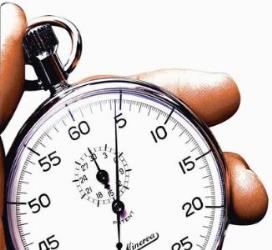 When I take off my instructor hat and walk into a class as a participant, I have two expectations beyond the obvious (getting a good workout):
When I take off my instructor hat and walk into a class as a participant, I have two expectations beyond the obvious (getting a good workout):
1. The class will start on time.
2. The class will end on time.
I understand there are exceptions to every rule and occasionally instructors get started a little late or run a bit long, but in general, I think it is important that we make a concerted effort to stick to the official schedule.
Why? For me, it comes down to being respectful of people's time and making sure members' expectations match up with reality. If the schedule says class will run from 5:30 to 6:15 p.m., folks probably anticipate a 45-minute class that starts at 5:30 p.m. and ends at 6:15 p.m., and they should! There may be participants like the one in Krista's recent post who take extreme measures to be at class early. There may also be people who feel bad about leaving "early" in the event that class ends late. Straying from what is expected increases the likelihood that participants will leave feeling disappointed, frustrated or annoyed.
Whether you are a hyper-prepared instructor or a professional improviser, there are several things you can do to ensure you start on time and end on time. Below are my thoughts regarding time management in the cycle studio.
Arrive 15 minutes early. I don't just mean walking into the building 15 minutes before class starts; I mean walking into the studio dressed and ready to teach 15 minutes before class starts. This will give you time to get your music ready, test the microphone, adjust your bike settings, greet members, answer questions, and assist new participants with bike setup.
Read announcements before class starts. I typically turn on my microphone to make announcements 1 to 2 minutes before class begins. That way, when 5:15 a.m. or 5:30 p.m. hits, I am ready to push play and teach immediately. Every minute counts.
Have a plan. I don't like to feel unprepared and I also don't like looking at the clock, so my profiles are planned out down to the minute to avoid both of those situations. Preparing a thorough class plan allows me to focus on my participants instead of the time.
Be consistent with cool down. If you teach every Thursday from 5:30-6:30 p.m., pick a time when you will start cool down and stick with it. That way, even if you improvise in your classes, you know that when 6:25 p.m. (or whatever time you choose) rolls around, you better start slowing things down.
Stay focused. Talking too much can throw a wrench in class plans; I know, because it has happened to me. I can recall multiple occasions when I had to shorten hills or alter drills because I was long-winded with a story or something that was on my mind. Being conversational has its positives, but it is also important not to get too carried away.
What are your strategies for time management?
Originally posted 2013-04-11 12:34:24.
- Speak their Language: New Participants - November 29, 2023
- Give Participants Ownership with Interactive Drills - May 10, 2021
- You have the right to remain silent! - March 26, 2021

John, you pretty much nailed me. This is my “secret” recipe for a successful class.
The only one thing that I would add is to be prepared for the unexpected. Things like your playlist going bonkers mid class, microphone failures. Have spare everything (batteries, cables, Bluetooth adapter, fallback CD, etc.).
And when failure is inevitable, allow yourself to fail gracefully and focus on what is important – continue the class.
Many times my sweat kills the microphone and I learned that the best course of action is to turn off the microphone, lower the music and continue using lung power.
Also keep in mind that many failures are never perceived by students.
Thanks for that feedback, Alan! Great points. I wrote the article, not John. However, it would be interesting to learn his strategies as well.
Oops! Sorry Jennifer. I just realized that. I was trying to add my two cents before my lunch hour was gone. :/